walruslover69
Hazard to Others
  
Posts: 231
Registered: 21-12-2017
Member Is Offline
Mood: No Mood
|
|
Improved Purification Procedure Decarboxylation of L-tryptophan to Tryptamine with Benzoate salt
I apologize for the separate topic, I know there are already a lot of tryptophan decarboxylation threads.
I have tried the traditional decarboxylation of tryptophan in a nonpolar solvent with a ketone catalyst, I have gotten it to work although with less
than ideal yields. However it is one of the worst reactions I have ever run. I have consistently had problems with large amounts of red/brown tar
forming during the acid base extraction. Cleaning all the tar out of my glassware is a real pain. The traditional procedure usually washes the aqueous
layer with DCM, which works, however it uses a fair amount of DCM close to 100ml which is a something that is a hassle to acquire itself. After
tinkering with the extraction a lot, here is my optimized purification procedure, with attention given to OTC materials
Decarb- 10g of L-tryptophan was mixed with 95ml of Turpentine and 5ml of Acetophenone. Another ketone such as clyclohexanone or spear mint oil can be
substituted based on availibility. The contents are heated to ~165oC for roughly 45 minutes under stiring or until the solution goes clear
and CO2 evolution ceases.
Purification- A solution of 10 grams of benzoic acid in the minimal amount of Acetone is added (~20ml acetone) to the cooled reaction flask.
Tryptamine benzoate should immediately crash out as a light brown colored powder which is easily filtered off and washed with 1:9 Acetone:Hexane or
1:9 Acetone:Toluene. The resultant off white solid is probably clean enough for most uses depending on how thoroughly you wash it. For
recrystallization ~1.5g of salt is dissolved in 100ml of boiling 2:8 Acetone:Hexane, the solution is left to cool to room temp and then in a freezer
to form nice fluffy white crystals.
Tryptamine Benzoate after percipitation, filtration and rinse with THF
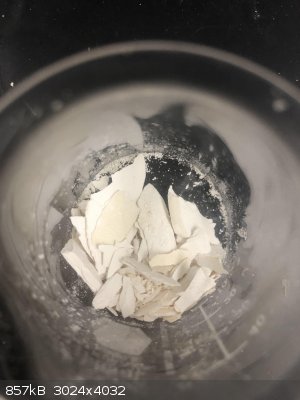
Tryptamine Benzoate after crystallization
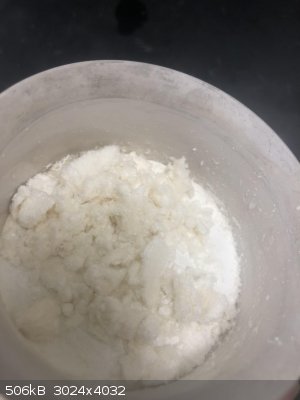
Notes/discussion - This is the first report of tryptamine benzoate I am aware of. I chose benzoic acid for the work up for a number of reasons,
first, benzoic acid avoids the use of aqueous solutions which can degrade the product and require numerous extraction steps and washings.
I was originally inspired by the addition of anhydrous HCL to precipitate the hydrochloride salt, but benzoic acid removes the somewhat hazardous step
of bubbling HCl generated from NaCl and Sulfuric acid.
Benzoic acid is also soluble enough in the reaction mixture, especially with the addition of 20ml acetone. For that reason alternative acids like
citric or fumaric are not used.
It is my observation that the benzoate salt is very stable, and not hygroscopic. I have left it out in open air ~35% humidity for 2 days and have not
noticed discoloration.
Finally benzoic acid is readily available as a food additive.
If hexanes are not available. Xylene can be substituted since you can buy it by the gallon at most home improvement stores.
I found that the benzoate salt is almost completely insoluble in ethers such as THF, diethyl ether and dioxane, while all of the brown impurities are
quite soluble, therefore if you have any of these on hand, you could simply wash the precipitate thoroughly to obtain a white powder, and skip the
recrystallization.
Let me know what any of you think. I plan on uploading pictures later. Additionally I plan on posting some characterization info for the benzoic acid
salt such as melting point and solubilities since it is the first report. I will also update with my final yield, as I haven't recrystallized all of
product yet. I expect the final yield to come out to roughly 6g of tryptamine Benzoate or 3.5g of Tryptamine freebase which isn't an amazing yield
(~45%) but from how incredibly easy the procedure is and how clean the product looks, It is well worth it since all of the precursors are OTC and
cheap.
Solubility Data-
Hexane- insoluble (<2g/L)
Toluene- insoluble (<2g/L)
DCM- insoluble (<2g/L)
Acetonitrile- insoluble (<2g/L)
Water- Slightly soluble (~4-6g/L)
[Edited on 3-4-2021 by walruslover69]
|
|
|
AvBaeyer
National Hazard
   
Posts: 651
Registered: 25-2-2014
Location: CA
Member Is Offline
Mood: No Mood
|
|
You report a useful method for the isolation of tryptamine. You may be interested in the attached article from 1964 which reports a number of
crystalline salts of 5-methoxytryptamine all of which may be similarly useful for the isolation of tryptamine. The method of salt preparation is also
given and is similar to your methods in a general sense. I found this paper when I was trying to find methods for purification of 5-methoxytryptamine
after hydrolysis of serotonin. I hope you find this informative.
AvB
Attachment: 5-Methoxytryptamine salts taborsky1964.pdf (236kB)
This file has been downloaded 758 times
|
|
|
walruslover69
Hazard to Others
  
Posts: 231
Registered: 21-12-2017
Member Is Offline
Mood: No Mood
|
|
That's a really interesting short paper. I have tried using aqueous acid extraction with acetic acid and citric acid. I remember the acetic acid run
having a lot more brown gunk than the citric acid, but that could have been a difference between runs. I think avoiding aqueous solutions is the way
to go. If someone would be willing to add info to the sciencemadness wiki I would be more than happy to collect some rough solubility and melting
point data. I've noticed a lack of quantitative information regarding the subject, and I'd like to help just get the information out there.
|
|
|
mr_bovinejony
Hazard to Others
  
Posts: 130
Registered: 20-4-2018
Member Is Offline
Mood: ASS
|
|
Thanks for this. I've had minimum luck with trying to isolate fumarate and oxalate salts of tryptamine. I'll give this a shot
|
|
|
dawt
Hazard to Self
 
Posts: 74
Registered: 9-5-2016
Location: EU
Member Is Offline
Mood: fluorescent
|
|
Nice! I made some tryptamine a few months ago which has just been sitting in the fridge and been slowly decomposing, having taken on a deep red color
and reeking of ammonia.
This tryptamine (8.80 g, 54.9 mmol, 1 eq.) was dissolved in 54 g toluene and 5 g acetone and warmed to 45 °C under stirring until it dissolved,
forming a deep red solution with a small amount of dark oil pooled at the bottom of the flask. In the meantime a solution of benzoic acid (7.40 g,
60.4 mmol, 1.1 eq.) in 20 mL acetone was prepared in the same fashion, and added to the tryptamine solution under stirring. A tan-colored solid
immediately seperated, and was suction filtered after cooling. The solids were washed with several portions of MTBE and air dried to yield 11.80 g (76
% of theoretical 15.50 g) of tryptamine benzoate as an off-white solid.
I'm sure I could've got a few more % out of it by cooling the mixture further and scraping out the erlenmeyer better (it actually produced quite a
thick sludge), but I'm just happy I saved my tryptamine from completely decomposing before I figure out what to do with it. I don't have plans with it
ATM, I only made it because I thought I'd start with this one since it's so well documented before moving on to the other amino acids (eyeballing
tyrosine and histamine next).
The salt looks a lot more yellow in this picture than it does in natural light, btw.
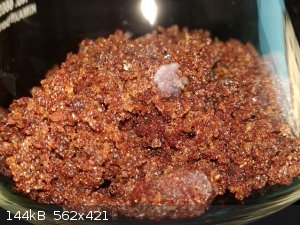 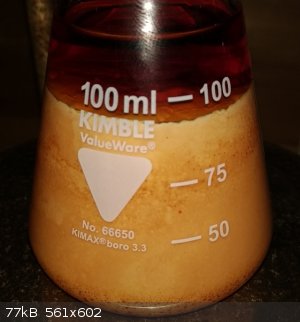 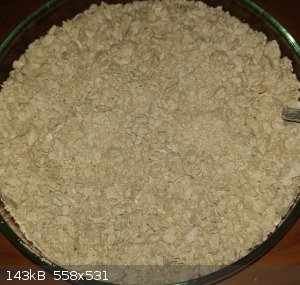
[Edited on 2021-4-6 by dawt]
|
|
|
njl
National Hazard
   
Posts: 609
Registered: 26-11-2019
Location: under the sycamore tree
Member Is Offline
Mood: ambivalent
|
|
This seems like an enormous improvement on existing techniques. Congrats on your success!
Reflux condenser?? I barely know her!
|
|
|
clearly_not_atara
International Hazard
    
Posts: 2787
Registered: 3-11-2013
Member Is Offline
Mood: Big
|
|
simple, otc, efficient and clean -- sounds worthy of a topic to me!
|
|
|
karlos³
International Hazard
    
Posts: 1520
Registered: 10-1-2011
Location: yes!
Member Is Offline
Mood: oxazolidinic 8)
|
|
I found this quite intriguing too, thank you for sharing!
Very interesting!
|
|
|
mr_bovinejony
Hazard to Others
  
Posts: 130
Registered: 20-4-2018
Member Is Offline
Mood: ASS
|
|
I'm curious if you plan on using this benzoate salt in some other reactions with tryptamine, or if you are going to convert to the freebase if you
plan on using it? I would think sodium benzoate wouldn't cause a problem in the common reactions done with tryptamine
|
|
|
bipolar
Harmless

Posts: 24
Registered: 24-3-2019
Member Is Offline
|
|
Your product could be a mixture of tryptamine-acetone ketimine, tryptamine benzoate and maybe even some benzoic acid (last one is very unlikely
though).
If possible, take melting point, or at least see if it's fully dissolving in hot (~90°C) water (5-10x amount of your product). Or turning it into
freebase and taking m.p. would be good idea too.
Quote: Originally posted by dawt  | | This tryptamine (8.80 g, 54.9 mmol, 1 eq.) was dissolved in 54 g toluene and 5 g acetone and warmed to 45 °C under stirring until it dissolved
|
That's like a recipe on how to make isopropylidenetryptamine.
Although, it might've had partially hydrolyzed into tryptamine benzoate in the next step, so a mixture of two compounds as your final product is a
very likely possibility. Characterization is necessary (m.p., solubility in hot water, freebasing it, etc.).
People need to stop mixing acetone with tryptamine already :D. And with other amine freebases too (except for the tertiary ones).
[Edited on 8-4-2021 by bipolar]
|
|
|
dawt
Hazard to Self
 
Posts: 74
Registered: 9-5-2016
Location: EU
Member Is Offline
Mood: fluorescent
|
|
I agree with measuring the melting point, solubility, freebasing etc, but I strongly disagree with the suggestion that the product would primarily
comprise of the ketimine. The solid crashes out immediately when the benzoic acid is added, and ketimines simply don't form that readily.
|
|
|
walruslover69
Hazard to Others
  
Posts: 231
Registered: 21-12-2017
Member Is Offline
Mood: No Mood
|
|
I think the presence of a large proportion of the ketimine is unlikely. I have done the precipitation procedure with the benzoic acid dissolved in THF
instead of acetone, and got exactly the same results. I attempted to run a TLC, but i don't have any capillary tubes at the moment, and i just ended
up spotting it too heavy and having it streak.
I'll be sure to do the conversion to the freebase and take the melting point sometime this weekend.
|
|
|
mr_bovinejony
Hazard to Others
  
Posts: 130
Registered: 20-4-2018
Member Is Offline
Mood: ASS
|
|
I did this procedure. Heres how it went
20 grams of tryptophan mixed with 150 mls of turpentine and 5 mls of spearmint oil were added to a flask and refluxed. This took about 4 hours,
spearmint oil isn't as good as acetophenone in terms of a speedy reaction but whatever. After it went clear and dark orange I took it off heat and let
it cool. Upon cooling it turned dark brown. During this cooling time I prepared 20 g of benzoic acid in 50 mls of acetone. This was added to the
cooled reaction mix and stirred for about 20 seconds. The whole beaker turned brown and a very thick unstirrable mass was had. This was all added to a
buchner and vacuum filtered. Still brown, so I washed with acetone. This removed most of the brown, so I washed with thf which gave a nice off-white
powder. This powder was vacuumed for maybe 10 minutes and weighed 13.5 grams. It was still wet, but I went ahead with the recrystallization. Heres
where it failed. I didn't want to use all my hexane so I mixed 600 mls of xylene with 200 mls of acetone. This along with the powder was brought to a
boil for 20 minutes, and I couldn't tell if anything dissolved. Assuming it was crap, I filtered again and am now waiting for the xylene/acetone to
cool to see if anything falls out. Still have the white powder in the filter as well, will take a melting point when it's dry.
|
|
|
Boffis
International Hazard
    
Posts: 1867
Registered: 1-5-2011
Member Is Offline
Mood: No Mood
|
|
Nice procedure you have developed here, as so often the devil is in the isolation of your product! This is a really interesting and useful procedure
for the isolation of tryptamine and its nice to see others can reproduce the results!
|
|
|
mr_bovinejony
Hazard to Others
  
Posts: 130
Registered: 20-4-2018
Member Is Offline
Mood: ASS
|
|
Here is the post washed and filtered paste
https://imgur.com/iP4piBT
And here is some of the paste mixed with 5 molar naoh
https://imgur.com/XQW2hzY
The sodium salt should be in the basic water by now, so it's going to be filtered and then sit out in the air to see if it gets the tryptamine brown
color. I have a hard time believing it is the freebase as I've only seen it white once.
If anyone knows a solvent system for TLC for this I can run it. At least between the final floaties in basic water and tryptophan this would give some
hope that it's tryptamine
The paste was soaked in acetone again and pulled on the vacuum.. heated on the water bath to dry it out and then a mp was taken with a thiele tube.
Got some melting around 170c, but all melted around 180c which too big of a range for any kind of identification
[Edited on 18-4-2021 by mr_bovinejony]
|
|
|
clearly_not_atara
International Hazard
    
Posts: 2787
Registered: 3-11-2013
Member Is Offline
Mood: Big
|
|
Acetone is a polar solvent, a hydrogen bond acceptor, and it can form an imine with tryptophan. Use chloroform if you have to be stingy here.
|
|
|
bipolar
Harmless

Posts: 24
Registered: 24-3-2019
Member Is Offline
|
|
Just made this benzoate salt by mixing solutions of pure tryptamine (mp ~118) and benzoic acid in DCM.
Melting point:
in capillary - ~196°C;
on thermometer bulb - approx. 190-195° (it starts to sublime, so gotta heat it really fast).
I can repeat more accurately if you want, but it really annoys me to take mp in the capillary  , since I almost always take it on thermometer head. Anyways, this should give the idea of its approx. mp ±2-3°. , since I almost always take it on thermometer head. Anyways, this should give the idea of its approx. mp ±2-3°.
|
|
|
karlos³
International Hazard
    
Posts: 1520
Registered: 10-1-2011
Location: yes!
Member Is Offline
Mood: oxazolidinic 8)
|
|
Thank you bipolar for that very helpful data!
Hope you and your people are alright, haven't visited in a while sadly.
Take care!
Best,
carl 
[Edited on 18-4-2021 by karlos³]
|
|
|
mr_bovinejony
Hazard to Others
  
Posts: 130
Registered: 20-4-2018
Member Is Offline
Mood: ASS
|
|
I am very happy to report a kind of pure tryptamine product from the benzoate salt. My thiele tube technique is trash and I read a mp from 114-120,
but it's close enough to where I know it isn't tryptophan. Heres a picture of the product with its signature glow under uv light
https://imgur.com/ZlN5Rvs
The final yield of the dried product
https://imgur.com/BYdHan2
[Edited on 20-4-2021 by mr_bovinejony]
|
|
|
mr_bovinejony
Hazard to Others
  
Posts: 130
Registered: 20-4-2018
Member Is Offline
Mood: ASS
|
|
Did some more testing, It looks like anhydrous ipa can be used as an alternative to acetone. But due to the price, I don't see why you'd want to use
it. Until we get some real data on these products, acetone will continue to be the main solvent of choice.
|
|
|
Konduktor
Harmless

Posts: 7
Registered: 9-4-2021
Member Is Offline
Mood: Stressed & Depressed ®
|
|
How does one convert tryptamine benzoate to its freebase form? Is dumping it into a strongly basic solution enough? Does anyone have a working
protocol for this?
|
|
|
Antigua
Hazard to Others
  
Posts: 155
Registered: 27-9-2020
Member Is Offline
|
|
The same as with any other amine salt. Drip it into a stirring solution of somewhat dilute sodium hydroxide that's being cooled. Molten tryptamine is
no fun to work with.
Then let settle and filter.
|
|
|
Konduktor
Harmless

Posts: 7
Registered: 9-4-2021
Member Is Offline
Mood: Stressed & Depressed ®
|
|
I report succesful (?) purification of crude tryptamine by converting it to it's benzoate salt and then back to freebase amine.

12 g of crude, heavily oxidised tryptamine, which was a product of carvone-catalysed L-tryptophan decarboxylation was dissolved in a mixture of 100 ml
toluene, 10 ml acetone and 10 ml chloroform, and filtered warm throung a cotton plug. Into the filtered mixture 12 g od benzoic acid in 20 ml of
acetone was added, which resulted in formation of thick, unstirrable mass.


Light-brown solid was then vacuum-filtered and air-dryed for three days out of direct sunlight. 16.86 g of tryptamine benzoate was obtained. The mass
forming upon the addition of benzoic acid is very hard to work with and messy, so most of the losses come from the fact that I only had a small
Buchner funnel avalible and did not care to transfer every single bit of the percipitate.
In order to convert the salt back to freebase tryptamine, all of the solid was dumped into a heated dillute HCl solution with strong stirring. The
tryptamine HCl salt dissolved, while benzoic acid dropped out of the soluiton as white, crystalline solid, which was separated from the mixture by
gravity filtration. Then, concentrated NaOH was added dropwise until a pH of around 12, until all of the tryptamine fell out and all of the remaining
benzoic acid formed soluble sodium salt. The beaker was cooled again. Some sodium benzoate crystals appeared, but they were easily separated from
tryptamine, which formed an uniform layer on the bottom of the beaker. This was then vacuum-filtered and rinsed with ammonia solution, yielding 8.48 g
of tryptamine

The melting point is yet to be determined
[Edited on 8-7-2021 by Konduktor]
|
|
|
Master Triangle
Harmless

Posts: 19
Registered: 24-12-2013
Member Is Offline
Mood: No Mood
|
|
I have found that one of the best recrystallisation steps for purifying the tryptamine from carvone decarboxylation is adding ammonia to your salt
until the brown oily residue has finished coming out and some white tryptamine precipitate is persisting after stirring, then wash with a little
solvent, filter out any solids, and precipitate out all that remains with ammonia. I was having a lot of trouble getting rid of the last of the
impurities with just solvent washes alone but this worked a treat.
|
|
|